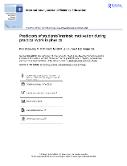Predictors of students' intrinsic motivation during practical work in physics

Autor
Datum vydání
2023Publikováno v
International Journal of Science EducationRočník / Číslo vydání
45 (10)ISBN / ISSN
ISSN: 0950-0693Informace o financování
UK/UNCE/HUM/UNCE/HUM/024
UK/COOP/COOP
Metadata
Zobrazit celý záznamKolekce
Tato publikace má vydavatelskou verzi s DOI 10.1080/09500693.2023.2175626
Abstrakt
In this study, we focused on students' intrinsic motivation towards practical work, more specifically the strength of predictors for intrinsic motivation. As a research tool, we used a modified Intrinsic Motivation Inventory supplemented by additional questions on attitudes towards physics. The respondents were more than 2000 Czech upper secondary students who had visited the Interactive Physics Laboratory (a lab offering hands-on experimenting for school groups). Using structural equation modelling, the data were examined with respect to the gender of the respondents, their intention to study STEM and their diligence in physics. For all three criteria mentioned, the perceived value and usefulness of activity emerge as the strongest predictor of intrinsic motivation, followed by effort invested into experimenting. The issue of effort is more strongly addressed by students who feel less diligent in physics and do not plan to study STEM. Both the students' perceived competence and felt pressure have a rather marginal influence on intrinsic motivation. Though the strength of predictors of intrinsic motivation is gender-similar, we found boys feel more competent and less stressed when experimenting. Further, diligent students and those who intend to study STEM feel more competent, perceive greater usefulness and feel less pressure during practical work.
Klíčová slova
Self-determination theory, intrinsic motivation, situational interest, practical work, physics teaching and learning
Trvalý odkaz
https://hdl.handle.net/20.500.14178/2326Licence
Licence pro užití plného textu výsledku: Creative Commons Uveďte původ-Neužívejte dílo komerčně-Nezpracovávejte 4.0 International






